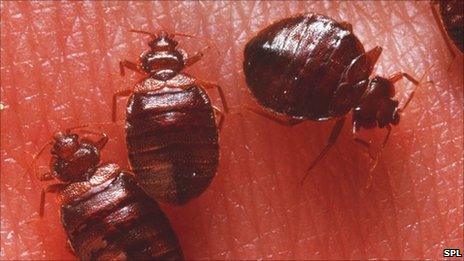Don't let the bedbugs bite
- Published

"Night night, sleep tight, don't let the bedbugs bite…" It's long been a favourite rhyme to send children off to sleep. But with experts warning of a worldwide bedbug pandemic, will any of us be able to sleep once we've turned out the light, asks Tom de Castella.
Vampire fiction may be all the rage. But the true bloodsuckers after twilight are not charismatic updates of Dracula but tiny insects living in our mattresses, headboards and pillows. Yes, bedbugs are back and pest controllers are warning of a global pandemic.
A recent survey of a thousand pest control firms, external around the world by the University of Kentucky and the United States' National Pest Management Association, appears to show that the bedbug problem is increasing everywhere.
"The results of the global study suggest that we are on the threshold of a bedbug pandemic, not just in the United States, but around the world," said Missy Henriksen, vice president of public affairs for NPMA.
A study led by the London School of Hygiene and Tropical Medicine last year found the number of complaints about bedbugs in the capital grew annually by an average of 28.5% between 2000-2006. And there's no sign of the problem abating with Rentokil reporting the number of bedbug call outs has gone up by 24% in the first half of the year.
Some British hotels have even taken to employing the services of a sniffer dog in a bid to root out infestations of the tiny insects (see box, right).
The problem is already big news in America. The nation's Environmental Protection Agency last month warned of an "alarming resurgence" of bedbugs, a creature the EPA says causes painful itching, allergic reactions, not to mention mental health problems and negative economic consequences. New York is the worst affected city with office buildings, cinemas and shops - including a branch of expensive lingerie chain Victoria's Secret - having to close.
Pop singer Lauren Hildebrandt detailed her trauma in a press release this week after being bitten by the insects while staying at an "upscale" New York retreat. "I couldn't sleep at night, because I kept thinking they were in my bed. I was unable to wear a bathing suit or even a tank top during this hot summer!"
Politicians have been forced to act. In the past week New York's state government has passed laws requiring landlords to tell prospective tenants of any bedbug infestation within the past year, and ordering schools to inform parents of any outbreak.
Experts have known about the resurgence in bedbug populations for the last decade but it's only now wider society has woken up to the problem, says Mike Potter, professor of entomology at the University of Kentucky. Part of that is because bedbugs are not disease carriers like mosquitoes or rats. And then there's the fact that they are seen as a bit of joke.
"For years people have belittled the problem of bedbugs but now they're beginning to understand this is serious," he says. "Sleepless nights, constant anxiety, the expense of extermination and then not knowing if you've got rid of them, all creates a huge amount of emotional stress that shouldn't be pooh-poohed."
Even the term bedbug is misleading now with the creatures popping up in laundries, shops, children's nurseries, schools and hospitals. Bedbugs may not be able to fly or jump but they have a natural ability to stow away in luggage, beds or sofas and come out to feed when they find themselves close to someone sleeping.
Prof Potter fears for the future unless urgent action is taken.
"There's absolutely no reason to think that this bedbug problem is going to subside on its own. When you look at where we'll be in two years' time and the rate of increase it's going to be very serious. This is the most challenging pest problem for the developed world in a generation."
But why are their numbers on the march again? Clive Boase, a British entomologist who runs a pest management consultancy, says we grew complacent after tackling the last great outbreak before World War II.
In the 1930s there were large swaths of London where every house was infested. It took an investigation by the Ministry of Health and the Public Health Act of 1936 to force councils to take action.
"Then from the late 30s their numbers declined. The introduction of DDT in 1946 is the reason normally given for wiping out bedbugs but by then the problem had been more or less treated. DDT was just the final nail in the coffin for bedbugs."
The 60s, 70s and 80s were the "golden years" in Britain with bedbugs beaten back.
Climate change and growing international travel, have been cited as reasons for the bedbug's comeback. But Mr Boase rejects both explanations.
It is far more likely that bedbugs have become resistant to commonly used insecticides in the West, he argues. Interestingly the global survey showed pest control firms in Latin America and Asia where stronger, organophosphate chemicals are permitted, found it easier to control bedbugs, he says.
Mr Boase says there is an urgent need to develop new, more effective bedbug-killing insecticides which are also environmentally acceptable.
"We can still get rid of bedbugs from premises here even with the problems we've got with resistance to insecticides. But we just need to work harder."
In the meantime householders need to be more vigilant in reporting the problem early.
Richard Mosely, technical manager at the British Pest Control Association, says the apparent harmlessness of the insect is another reason for their return. Because bedbugs are not lethal like the hospital infections policymakers feel there's no need to act.
"You may not get the emphasis you would with MRSA. That is a killer. This bug draws blood but doesn't spread disease."